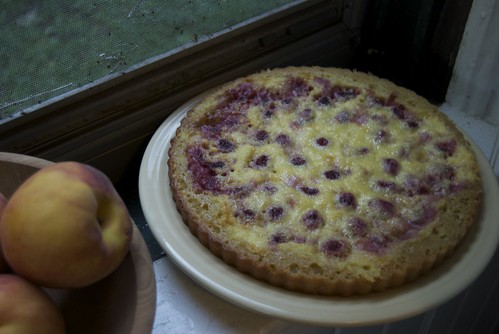
So, I'm on this road to the farm. I don't write about it very much, instead I write about things that I make that are important to me and that I consider to be part of the journey along this road*. I try not to forget that the journey is what makes up life and that all these little things along the way matter as much as when, maybe someday, I have a piece of land and a homestead.
Lately I have been asking myself this question: Why is it that in these modern times, when I don’t have to cook, sew, or plant a seed to survive or enjoy life, that is exactly what I want to do? For me, pursuing my dreams doesn’t necessarily involve a graduate degree or a high paying job. Maybe this is a bad thing. Doctors, lawyers and scientists do good things for many people that are often far reaching. Money and power can be used to change the world for the better, though they are not used that way nearly enough. Just as I pondered my dreams, my passions, my hope of making the world better in some small way, I came across a book that helped to illuminate many of the thoughts I had and to distill them into a very compelling argument to keep following the path that I am on.
Radical Homemakers, by Shannon Hayes, is about "reclaiming domesticity from a consumer culture" and putting "family, community, social justice, and ecological integrity" first. Not only is this book a wealth of information about the history of homemakers and an inspiration to those who wish to pursue this lifestyle, but it finally gave me a word for what I want to be when I grow up. Its been years since I have written a book review, but I wanted to share some of my thoughts on this book because I found it very important.
Even though I have never really focused on a career, instead following the path where it has led me, it's still kind of hard to say that being a homemaker is what I want to do. The term homemaker, though more neutral than housewife, still has strong connotation, perhaps as someone who has decided to give up his or her personal goals to stay home and take care of others. In her book Hayes addresses this and points out that choosing this homemade, low consumption life is going strongly against the grain of society. It can be difficult to give up the generally accepted markers of success. Instead of an impressive salary, a prestigious title, or just validation and appreciation from a boss and coworkers, you choose to center your life around something different. Although modern conveniences have given us the freedom to choose their career and to buy whatever we want or need, this makes it hard to escape corporate control and the need for our weekly paycheck. Letting go of consumer culture allows us to strengthen connections to family and community and, through this, find "personal fulfillment and cultural change."
Its not to say that everyone must quit their job and start growing their own food, its just that we could all shift our priorities to more deeply nurturing and supporting our families and friends, our communities, perhaps being more mindful of what we eat, what we buy, and how all of this affects society and the earth. Changing our priorities has the potential to change the world for the better. It reminds me of a line from Wendell Berry's beautiful poem, Manifesto: The Mad Farmer Liberation Front, "Put your faith in the two inches of humus that will build under the trees every thousand years." Its a shift from putting our faith in dollars and what we want to spend them on to making connections with the elements of day to day life. Its not about people giving up their careers, but about men and women deciding what really matters.
I recommend this book to everyone, especially this who feel a pull in this direction or anyone who wants to learn more about aspects of our consumption driven society. It helped me to realize that the "career" I want is viable, that what I want to do doesn't have to be solely focused on generating income because it is possible to live on less, and that going in this direction will create positive change in the world. I sense that more and more people are focused on creating instead of consuming, that the local/homemade/homegrown food movement might not just be a trend, and radical homemaking is connected to all of this. There is so much more in this fascinating book. I found it inspiring and I wanted to share.
*Like this raspberry creme fraiche tart that didn't turn out that well, but makes for a colorful beginning to this post.
-->

Anna,
ReplyDeleteThis is a great post. I had never seen that Wendell Barry poem, thanks for that. Keep thinking, creating, writing, you are a big, big inspiration!
xo, Heidi